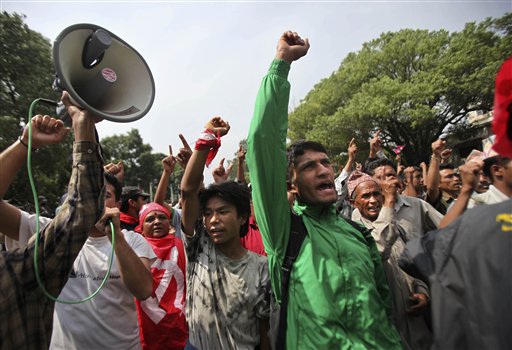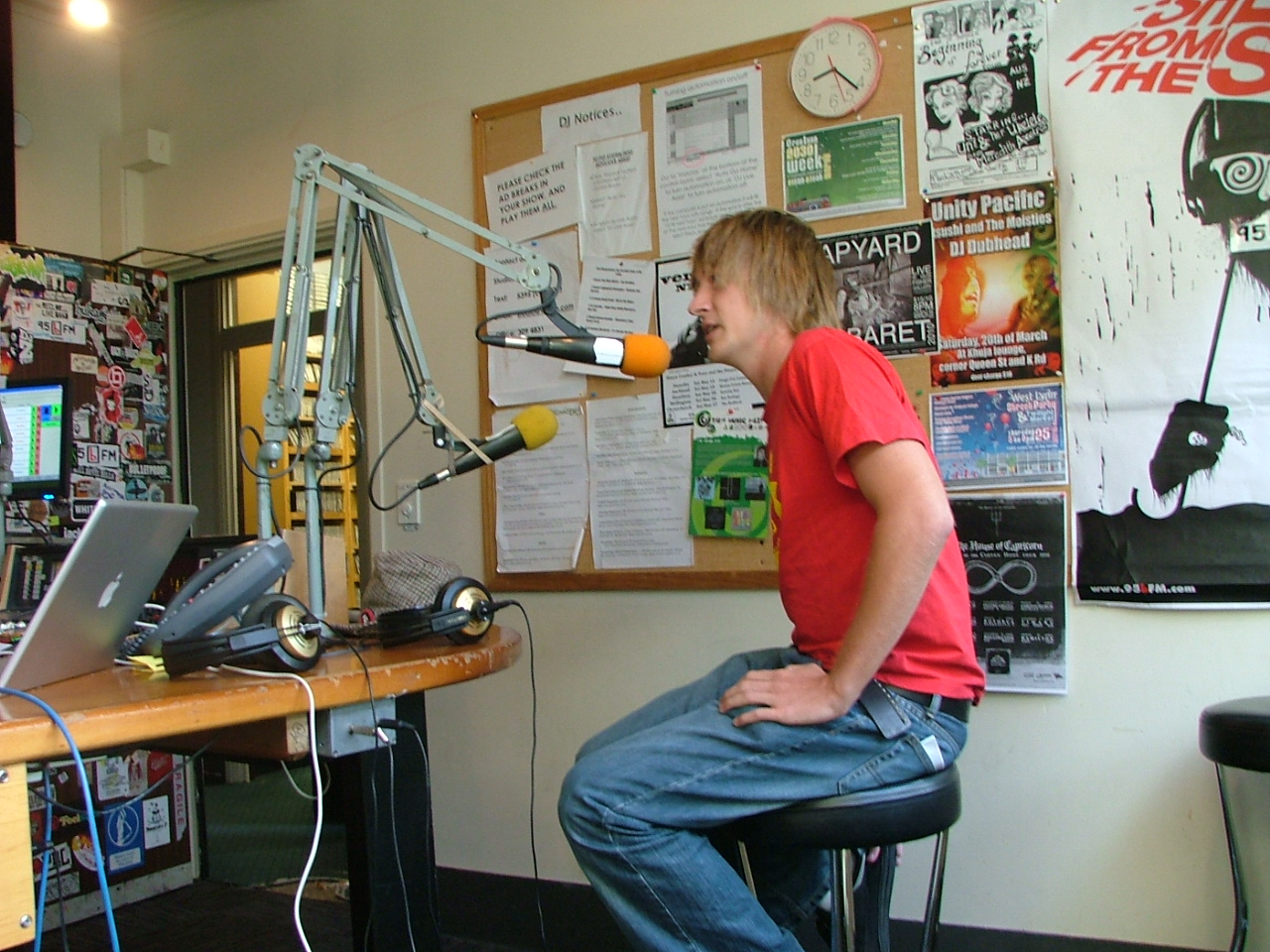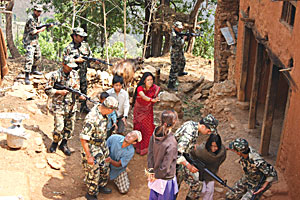The following joint statement of solidarity has been signed by a number of left and progressive organisations in the Asia-Pacific region. If your organisation would like to sign on, please email international@socialist-alliance.org
On May Day, international workers’ day, a huge demonstration of between 500,000-1 million people took place in Kathmandu. Called by the Unified Communist Party of Nepal-Maoist (UCPN-M), people came from all over Nepal to make their voices heard. It was the largest demonstration since the fall of the centuries-old monarchy and was the culmination of a growing series of mass demonstrations and strikes aimed at restoring civilian supremacy and democracy. Continue reading “Support the struggle for democracy and social justice in Nepal”
Eyewitness to the revolution in Nepal: Interview with Ben Peterson
By The Spark reporters

In 2009, Ben Peterson, a young Australian member of Socialist Alliance, spent four and a half months in Nepal, spending much of his time there with the Maoist revolutionaries and speaking to them about the revolutionary process taking place there. He had been reading everything he could find on the Nepali revolution while still in Australia but, frustrated by the lack of accurate information in the media, decided to go to Nepal to see and experience the revolution for himself.
This March Ben made a speaking tour of New Zealand in a visit organised by the Workers Party and Socialist Worker, with support from the Alliance in Christchurch and the International Socialist Organisation in Dunedin. The tour was organised to promote awareness of the revolutionary process in Nepal, especially as the revolution moves towards a critical phase there. We interviewed Ben at the beginning of the NZ speaking tour. Continue reading “Eyewitness to the revolution in Nepal: Interview with Ben Peterson”
Ben Peterson interviewed by Mikey Havoc on 95bFM

Hear Ben’s interview where he talks about the revolutionary changes in Nepal http://www.95bfm.co.nz/assets/sm/195354/3/BenPeterson.mp3
Ben Peterson on his experience in Nepal
Reprinted from UNITYblog
Ben was kind enough to answer some questions for UNITYblog about his experiences in Nepal.
When did you go to Nepal? How long were you there for?
I was in Nepal last year from the beginning of March to July, about four and half months in total.
Why did you go to Nepal?
 I went to Nepal specifically to see the social and political transformations taking place there. I’d first come into contact with the revolutionary process there in 2006, but didn’t really start to study what was happening there until 2008 when the Maoists won the Constituent Assembly elections. The more I read into what was happening there the more excited I was. But all the time it was really hard to find good and reliable sources of information, particularly from a progressive point of view. So I decided that to really get a handle of what’s happening there, I should go and see it for myself. Continue reading “Ben Peterson on his experience in Nepal”
I went to Nepal specifically to see the social and political transformations taking place there. I’d first come into contact with the revolutionary process there in 2006, but didn’t really start to study what was happening there until 2008 when the Maoists won the Constituent Assembly elections. The more I read into what was happening there the more excited I was. But all the time it was really hard to find good and reliable sources of information, particularly from a progressive point of view. So I decided that to really get a handle of what’s happening there, I should go and see it for myself. Continue reading “Ben Peterson on his experience in Nepal”
Australian activist speaking on his year in revolutionary Nepal
When a peoples’ movement overthrew Nepal’s
hated King Gyanendra and the oppressive
monarchical structure in 2006, not much was heard
about it in NZ.
Yet exciting things are happening in Nepal today
that deserve our attention. The Nepalese people
are striving to build a new and better society.
We now have a chance to find out more. Ben
Peterson is a young Australian activist who spent a
year in Nepal witnessing first hand the revolutionary
struggle. He will be in NZ from 21-26 March 2010. Check out the flyer on Ben’s tour of New Zealand: Ben Peterson flyer
Nepal – Ripe for Revolt
Alistair Reith The Spark October 2009
Since the resignation of the Maoists from government earlier this year, Nepal has been engulfed in political turmoil. Maoist members of the Constituent Assembly have been protesting and preventing the parliament from operating. Rallies, strikes and clashes between supporters of different parties have become a part of everyday life, and the leadership of the Unified Communist Party of Nepal (Maoist) has been making increasingly loud and frequent threats of a ‘people’s revolt’.
The Maoists continue to alternate demands for a national government to be formed under the leadership of their party with threats of revolt if this does not happen. They also assure that the formation of a new national government will be a means for them to move towards full-blown popular revolt. Vice-Chair of the party (which has recently adopted a system of multiple vice-chairs and a more collective form of leadership) Baburam Bhattarai stated that there is “no alternative” to a Maoist-led government. He said that if this does not happen, it will be impossible to move forward with the peace process and the drafting of a new constitution. Continue reading “Nepal – Ripe for Revolt”
Presidential coup in Nepal
The Spark June 2009
Alastair Reith
The last time The Spark carried news from Nepal, the story was positive. The Unified Communist Party of Nepal (Maoist) had been elected to government with just under forty percent of the seats (more than the next two parties put together). Its leader Prachanda was Prime Minister. Previous to this, it had waged a decade long People’s War that liberated eighty percent of the countryside and radicalised the workers and peasants of the country in support of revolutionary change. Under the slogan of a new Nepal, the Maoist-led government attempted to bring about land reform, build national industry, empower and improve the lives of workers, and fight against the domination of foreign imperialism, and Indian expansionism. However, this article describes events of a much less positive nature.
Over the past months, the Maoist government has been almost completely unable to advance its revolutionary programme due to the resistance of its coalition partners. At every turn, it found its progressive efforts blocked by the non-revolutionary parties it had formed a government with. Continue reading “Presidential coup in Nepal”
And If a Showdown Comes in Nepal…?
A piece by Mike Ely reprinted from Kasama.
Jaroslav writes a critique of the revolutionaries in Nepal. He rejects the idea that they may be working to show large numbers of people, through living political practice, that there is a need for a new revolution:
“I am not saying [the people] had all the education they need for seizure of power, I’m saying that what UCPN(M) is doing now is not contributing to any further education. Either people get it & it is repetition, or they don’t & it’s not helping.
This is a remarkable claim. I want to use this remark as a jumping off point — for some comments that are not aimed at anyone personally. They are aimed at a mix of dogmatism and deep cynicism has (unfortunately) paralyzed too many people who sincerely want radical change.
Maina’s story
Film screening Blockhouse Bay Community Hall Sunday 1 March 2009
Maina is based on the real story of a 15 year old girl from a remote village in Nepal. She was arrested by the Royal Nepal Army and brutally killed. Maina Sunar’s case got attention because of the struggle of her mother, Debi, to find out what had happened to her daughter. Debi’s single-handed fight for justice when she found out Maina had been tortured and murdered got full media attention. The Nepali Times describes the film as “gritty in its cinematography, portraying the stark reality of rural Nepal in a time of war”.
The premier showing of this moving story was inaugurated by Nepal’s new Prime Minister Prachanda.
‘I began thinking of making the film in 2006, (after the fall of King Gyanendra’s army-backed government),’ said Pathak, who, as a communist filmmaker took part in the anti-king protests that rocked Nepal in April 2006.
‘Even after the restoration of democracy, the killers got away scot-free, impunity flourished and there was still no rule of law. I made the film to pressure the government into punishing Maina’s killers, to serve as a reminder to the political parties how things are during a dictatorial regime.’Nepali filmmaker K.P. Pathak chose Maina’s story among the tens of thousands of wrenching tales of torture, executions and disappearances to make ‘Maina’, the first Nepali film to look at the conflict in Nepal and its legacy through the eyes of the victim’s family. (sulekha.com)

English subtitles
Screening at Blockhousebay Community Hall Sunday 1 March 2009. Show will start at 6:45pm 524 Blockhouse Bay Road, Blockhouse Bay, Auckland . Fundraiser: $10 entry
Nepal A Revolution in Progress
-Alastair Reith
The Spark December 2008-January 2009
Ever since the destruction of the Soviet Union, the capitalist class has told us that communism is dead. We are expected to believe that this is as good as it gets, that the inequality and oppression inherent within the capitalist system will be with us forever and there will be no more revolutions. The ruling class declared the end of history. Unfortunately for them, the people of Nepal have decided not to listen.
The red flag flies from Mt Everest
A communist revolution is unfolding in Nepal, a small Himalayan country just to the North of India. Led by the Communist Party of Nepal (Maoist), the workers and peasants of Nepal are rising up and challenging the feudal oppression they face in their daily lives, and the neo-colonial domination they face as a nation.
The last time the Spark published news of the revolution in Nepal, the results of the Constituent Assembly elections had just come in. Despite the corporate media predictions that the Maoists would come in a dismal third place, the Maoists shocked the world by winning a landslide victory, taking 220 out of 575 seats, making them by far the largest party in the Assembly, with more seats than the next two largest parties combined! The elections revealed the level of mass support the Maoists have amongst the people.
